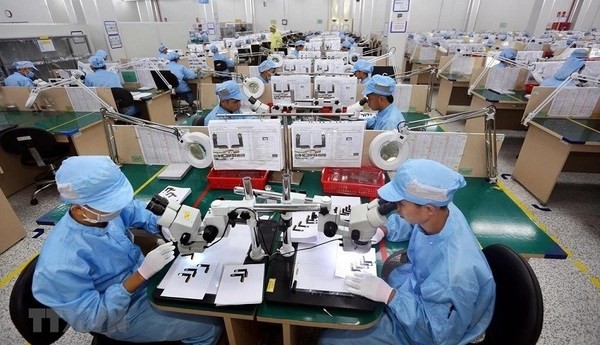
Electronic firms continue to shift investment to Vietnam
Latest
 |
| Electronic firms continue to shift investment to Vietnam. (Source: VNA) |
Recently, Apple revealed that it will move its MacBook production chain to Vietnam in 2023. It has asked Foxconn, its biggest supplier, to launch a MacBook production chain in Vietnam from May this year, while making plans to produce Mac Pro in Vietnam.
In 2025, about 20% of the total number of iPads and Apple Watches will be produced in Vietnam, along with 5% of the MacBook and 65% of the AirPods. Currently, 25 out of the 190 partners of Apple are running their factories in Vietnam.
Foxconn, after investing 1.5 billion USD in Vietnam, plans to invest additional 300 million USD in Fukang factory in Quang Chau industrial park in Bac Giang province.
Another Apple’s supplier, Goertek has announced its additional 300 million USD investment in Bac Giang. Meanwhile, Lxshare, which will assemble iPhone 15 Pro Max, is running six factories in Vietnam with a total of 40,000 labourers.
At the same time, computer producer Dell is striving to make sure all of its chips are produced outside China.
Electronics firm Pegatron is also building a factory worth about 481 million USD in Hai Phong, while moving its R&D centre from China to Vietnam at a suitable time.
Many other big companies such as OPPO, HP and Brose are also considering the relocation of production plants to Vietnam, while others, including Xiaomi, Bosch, Panasonic, Amkor, Sharp and Compal, also plan to expand its business presence in the country.
Particularly, Korean firm Samsung, after pouring 18 billion USD and launching Southeast Asia’s largest R&D centre in Vietnam, also plans to raise its investment in Vietnam to 20 billion USD in the coming time.
Another Korean electronics company, LG, is also making plans to inject additional 4 billion USD in Vietnam.
Dr. Ho Quoc Tuan, a lecturer at Bristol University, commented that Vietnam is benefiting from the diversification of production locations of international businesses.
Experts attributed the phenomenon to Vietnam’s advantages such as low-cost workforce, and the country’s engagement in 15 free trade agreements covering more than 50 countries, as well as Vietnam’s political stability.

























